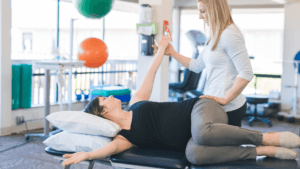Postpartum Physical Therapy in Jacksonville, FL
As new moms, we create checklists to help us become baby-ready. But did you add a checkbox for pelvic floor care? Our physical therapists have additional training in postpartum care and pelvic floor rehabilitation to help you prepare for and take care of a post-baby body.
Postpartum is everything that happens to you after the birth of your baby. Postpartum physical therapy can address any impairments and dysfunction that follow pregnancy.

What Does Postpartum Physical Therapy Treat?
There are issues you can develop as a result of being pregnant. Some of these symptoms can lead to pelvic floor dysfunction.
The physical therapists at Smart Body Physical Therapy are movement experts who prescribe hands-on care, exercise, and education to help you reach your goals. Our physical therapists have continued education in pelvic health and postpartum care training, making them uniquely qualified to assess and treat conditions specific to pregnancy. They can readily identify and diagnose movement dysfunctions particular to a post-baby body.
Postpartum physical therapy can treat the following conditions:
Urinary Incontinence
Most new moms expect some level of fatigue and discomfort after taking on the new role of motherhood, including experiencing new bowel or bladder issues. You may believe wetting your pants is a normal part of pregnancy and comes with the territory. Incontinence may be accepted, but it is not normal.
Pelvic Pain
Pelvic pain after recovery from pregnancy can be directly related to the physical trauma of pregnancy, nerve damage, joint dysfunction, or muscle imbalance. In turn, physical impairments can contribute to sexual dysfunction, painful intercourse, decrease motivation, inactivity, or avoidance.
Diastasis Recti
The idea of a hole in your belly, or diastasis, is terrifying, and new moms are often surprised to find an open space where their abdomen used to be. The muscles get pushed apart as your baby grows bigger in your belly and can remain separated if you don’t take care of it.
Pelvic Organ Prolapse
Postpartum Physical Therapy Treatments

Often, postpartum symptoms will improve over time. Still, they can worsen if you move or use your body in ways that continue to stress already weakened tissues.
Smart Body physical therapy helps you learn how to move your body to protect your spine, pelvis, and abdominals. It also teaches you to incorporate lifestyle changes and an exercise program to build strength to protect your core.
Our pelvic floor physical therapists can provide hands-on and individualized treatment, including:
- Manual therapy
- Exercise
- Biofeedback therapy
- Electrical stimulation
- Education
Manual Therapy
Our physical therapists receive additional training for specific hands-on or manual treatment approaches. They can utilize mobilization, kneading, and stretching soft tissues such as skin, muscles, and joints to create more range and less pain.
You can even learn how to perform manual therapy on yourself, such as reducing or pushing a prolapsed organ back in through your vagina. Your therapists can teach you the steps necessary for self-reduction or help you modify a technique for maximum comfort and result.
Exercise
Learn to strengthen your pelvic floor muscles using specific and purposefully strengthening exercises. A pelvic floor muscle contraction should feel like pulling your pelvic floor up towards your belly button.
You may even learn that you have done Kegels wrong or that you have been doing too much too soon. Understanding exercise progression and properly advancing muscle strength to bulk the tissue makes all the difference toward reaching goals.
Biofeedback
Sometimes, you have no idea which muscle is contracting or where your pelvic floor muscles are! Biofeedback is simply the principle of connecting your brain to your body and your body to your brain.
Biofeedback helps you change the way your body moves. Especially if the movement is subtle and you can’t quite get the knack of it. For example, when you feel stressed, you find your shoulders hugging your ears. When you touch or rub your neck, you remind yourself to let go and drop your shoulders.
From simple plastic tools to complex computers, there are many biofeedback tools in the marketplace to help you. Our therapists will teach you how to develop more control over your body using biofeedback. You can build strength or learn to relax tight muscles.
Electrical Stimulation
Transcutaneous electrical neural stimulation (TENS) uses the Gate-control theory of pain to block pain signals from entering the brain. This device can give you instant relief and may help to relax your pelvic floor muscles over time.
When pregnant, electrical stimulation treatments should only be used with medical supervision by your physical therapist.
Functional Training
Functional training can help to keep your symptoms at bay. Correct body mechanics and breathing techniques can improve your incontinence, prolapse, or pain and keep it from getting worse as you continue strengthening your pelvic floor muscles.
Our postpartum physical therapists will help you learn and practice good breathing exercises. Then, coordinate your breathing with various activities so that you can inhale and exhale at the correct times during transitional movements.
How Postpartum Physical Therapy Works
You should schedule and meet with one of our physical therapists when you feel recovered from delivery, which may be within a few days. Provide the therapist with your medical history and report on the details of your current state.
After your examination, you and your therapist will develop goals and a plan to achieve those goals. You have to consider the severity of your case, physical condition, and ability to adhere to your program.
The length of time in therapy can be as little as a couple of treatment sessions for instant relief or to address educational needs to as long as 12-16 weeks.
Treatment span depends on the ability of your body to heal and adapt to your new conditions. Your body is constantly changing, and your therapist will be able to adjust goals and treatment to reach your highest level of outcome.
Follow Smart Body Physical Therapy for more tips on body care after childbirth. You can learn more from our knowledgeable and trained pelvic floor rehabilitation therapists. We are happy to help you savor life again! Contact the Smart Body Physical Therapy team for an appointment at 904-296-4140.
Physical Therapy Throughout Pregnancy
You don’t have to wait until after your baby is born to see one of our pelvic floor physical therapists. You and your partner can benefit from seeing a physical therapist at any moment during your pregnancy journey.
- Before pregnancy: You or your partner can address posture, orthopedic, or pain issues you are experiencing. Symptoms can worsen after you give birth since you are weakened and tired. Find resources on preparing your body and your home for your new bundle of joy!
- During pregnancy: Maybe your symptoms have worsened, or you are developing a new condition. If self-treating or ignoring your symptoms aren’t working, call for help quickly! Stop suffering. You will only get bigger. Support is out there, so use it!
- After pregnancy: And of course, it’s never too late to address your symptoms. Suppose you suffered through pregnancy, hoping that your symptoms will go away after pregnancy, and then it doesn’t. In that case, count on trained professionals to help.
